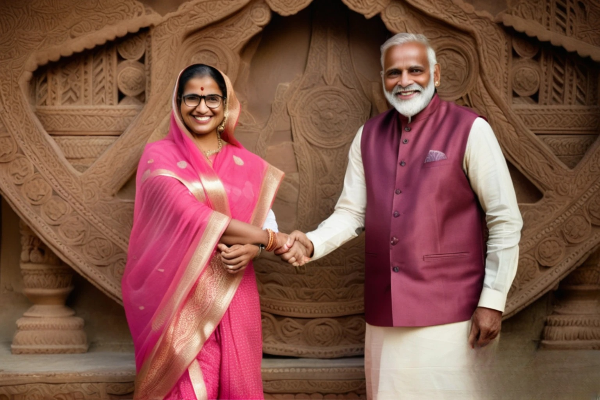Prime Minister Sheikh Hasina's upcoming visit to India will "strengthen" New Delhi's position as Bangladesh's closest political, economic and security partner, said Iqbal Sobhan Chowdhury, a former adviser to the leader.
"During the summit with Prime Minister Narendra Modi in New Delhi, the two leaders may be expected to address all key issues in bilateral relations. On the Bangladesh side, Teesta River water-sharing agreement, cross-border connectivity, security situation in Myanmar, economic and trade issues etc will be on the priority agenda," the former aide to the prime minister said.
Chowdhury stressed that Hasina's visit to New Delhi will be her second in less than a month and comes ahead of her planned visit to Beijing next month.
While the date of Hasina's arrival in China has yet to be announced, Dhaka Ambassador to China Yao Wen told media that the prime minister's visit will be a "game changer" in bilateral relations. New Delhi, which supported its neighbour militarily in the 1971 war of independence, is considered Dhaka's closest partner, but China's economic importance has grown since President Xi Jinping's visit to Bangladesh in 2016. China is now the country's largest trading partner.
Bangladesh is a signatory to the Belt and Road Initiative (BRI) and relies on infrastructure investments from the Chinese government. Last year, the country unveiled its first submarine base built using Chinese technology.
In New Delhi, Bangladesh's expanding economic and defense ties with China have been a focus of attention. The country has always stressed that it is "monitoring" all developments affecting its national security in South Asia and the Indian Ocean region.
At the same time, Chowdhury also explained Bangladesh's diplomatic dilemma.
"India and Bangladesh have historical ties dating back to the 1971 war. We are forever grateful to India. Bangladesh will not take any steps that will jeopardize India's national security interests." But at the same time, we are a developing country. We need investments to achieve industrialised nation status by 2041. China has received funding and is now an important development partner for us," the former aide said.
Meanwhile, Bangladesh has been strengthening cross-border ties with India in recent years to show New Delhi its "commitment" to the relationship, despite Hasina's government's courtship of Beijing, Chowdhury said.
"India's landlocked northeast region has benefited immensely from improved road and rail connectivity between the two countries," the foreign minister said. Jaishankar. Seven Indian states now have sea access via Bangladesh," he said.
On the Indian side, Modi has made strengthening bilateral ties with Bangladesh a foreign policy priority since 2014 under the Neighborhood First policy, including trade and investment, energy, power, defense, transport and development linkages.
The two countries will begin formal negotiations on a free trade agreement (FTA) in 2022. In 2015, the two governments signed a border agreement negotiated more than 40 years ago, which Hasina called a "major diplomatic success." The two countries work closely together under the Bay of Bengal Initiative for Multi-Sectoral Technical and Economic Cooperation (BIMSTEC), a seven-nation regional integration mechanism.
Teesta River Management Project: Focus of Hasina-Modi talks
Chowdhry stressed that the Teesta River Management and Restoration Project (TRCMRP) will be one of the key focus areas for Hasina-Modi talks.
Meanwhile, Mohammad Azaz, director of Dhaka-based consulting firm River and Delta Research Centre (RDRC), stressed to Sputnik India that the Teesta is the main source of livelihood for rural communities along the Bangladesh-India border. The river originates in the Himalayas in the Indian state of Sikkim and flows through West Bengal before emptying into Bangladesh.
"For years, Bangladesh has been accusing India of diverting the Teesta water by building dams upstream. The flow of the river weakens significantly when it reaches Bangladesh, necessitating the conclusion of a water diversion agreement," he said. But there was a lack of political will to conclude the agreement," Azaz explained. The diversion of the trans-border Teesta river has long been a bone of contention between Bangladesh and India.
During Hasina's last bilateral visit to India in 2022, she explained, she called on India to continue and sign the pending Teesta water-sharing agreement since 2011. During Xi's official visit to Dhaka in 2016, China agreed to assist Bangladesh in river management, including reclamation.
Azaz noted that the state-backed Bangladesh Water Development Board and China Power Construction Corporation had signed a memorandum of understanding for a feasibility study on the Teesta, the report of which was approved in 2019. He added that the two countries have tentatively agreed to "reclaim" over 170 square kilometers of land and develop an economic zone with industries, power plants and settlements.
Hasina told parliament this month that her government has asked the Chinese government to fund the $6.9 billion project on "facilitated terms". A reply to this is expected.
Meanwhile, Indian Foreign Minister Vinay Kwatra visited Dhaka on May 8 and 9 and offered India's support for the development of the Teesta river.
After Kwatra's visit, Bangladeshi Foreign Minister Hasan Mahmud told local media that funding for the Teesta project must meet the needs of the nation. In turn, river expert Azaz said the Teesta river project has become a very important project for Dhaka. "Bangladesh's priority is to get its fair share of water resources. We want to develop the basin and invest there. China has offered to develop the basin but if India comes with a better offer, we will certainly be positive," Azaz concluded.








